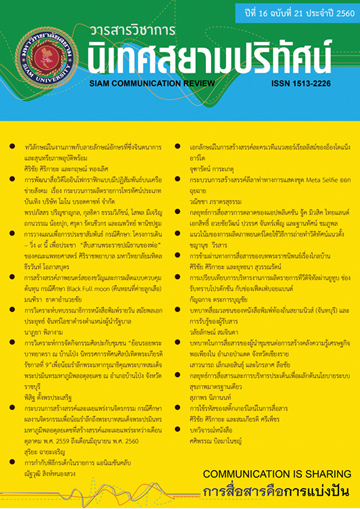Communication Role of the Community Leaders on Creation of Sufficiency Economy Knowledge in Padad District, Chiang Rai Province
Main Article Content
Abstract
The objective of this study was to investigate the communication role of the community leaders on the creation of Sufficiency Economy Knowledge in Padad District Chiangrai Province. The methodology used consisted of qualitative research based on Ethnography with in-depth interviews. The research findings revealed that in Padad District there were different types of community leaders, including formal leaders assigned by the government and local philosophers who were cultural leaders according to the traditional communal structure. All contributed to the creation of Sufficiency Economy knowledge in terms of projects, and new as disseminated to the community especially the communication through the formal leaders whose role was to coordinate between the community and the external social institutions. The conclusion of the research according to its objective revered that the community leaders derived the knowledge of Sufficiency Economy from the bank for Agriculture and Agricultural Cooperatives, local administrative organization, agencies at the district level. Mass media, as well as exchange with other people in their daily lives. Sufficiency Economy was defined in two terms namely self-immune agriculture and moderate lifestyle. The communication role of the community leaders was also divided into two types namely; formal communication and informal communication, both within and outside the community. The community leaders, whether formal leaders or local philosophers, set up the process of former knowledge on Sufficiency Economy from the mass media, the government, and discussions with other people. They then transferred the knowledge to the community, assuming the role of those who conveyed the knowledge with good communication skill. They were also supported by the success factors in creating the Sufficiency Economy knowledge in the community, including internal factors such as people and external factor such as social and cultural structures, lifestyle, economic situation, and common subjectivity.
Article Details
References
ทิพวรรณ หล่อสุวรรณรัตน์. (2549). องค์การแห่งความรู้: จากแนวคิดสู่การปฏิบัติ (พิมพ์ครั้งที่ 3). กรุงเทพฯ: รัตนไตร.
นครินทร์ เมฆไตรรัตน์. (2542). ปรีดี พนมยงค์กับการปกครองท้องถิ่นไทย. วารสารธรรมศาสตร์, 25(1), 35-43.
สุทธิภา วงศ์ยะลา. (2555). การสื่อสารเพื่อสร้างกรอบจินตนาการเศรษฐกิจพอเพียงสู่ชุมชน: กรณีศึกษาบทบาทชาวบ้านและผู้นำทางการปกครองในชุมชนอาข่า จังหวัดเชียงราย. วิทยานิพนธ์ปรัชญาดุษฎีบัณฑิต, มหาวิทยาลัยธรรมศาสตร์.
ออนไลน์
สุเมธ ตันติเวชกุล. (2544). ทรรศนะและประสบการณ์บริหารโครงการ. ยุทธศาสตร์การพัฒนา, 1(1), 25-39.ออนไลน์
ทีมข่าวเศรษฐกิจหนังสือพิมพ์ไทยรัฐและศูนย์พยากรณ์เศรษฐกิจและธุรกิจ มหาวิทยาลัยหอการค้าไทย. (2550). ทัศนคติของประชาชนต่อเศรษฐกิจพอเพียง: กรณีศึกษาตัวอย่างประชาชน 18 จังหวัด. เข้าถึงได้จาก http://elib.fda.moph.go.th/library/default.asp?page2=subdetail&id=7610


